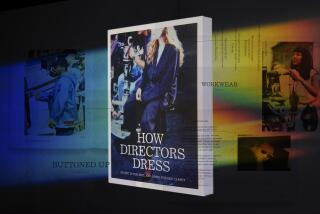Fantasy Role of Hollywood Princess : Edie Goetz Played It as the Dowager on Delfern Drive
- Share via
It would probably sound surprising that a journalist would want to write about the death of an 82-year-old woman who never worked a day in her life. Who wasn’t an actress or a writer or an executive or a pioneer. But Edie Goetz was the daughter of Louis B. Mayer, the founder of MGM, and that was almost enough. Forget that her Impressionist art collection not only prefigured all others in Hollywood, it was recognized throughout the world. Forget that her screening room in Holmby Hills was the first great Hollywood screening room of its era--not to mention that the Goetz house itself represented an almost too-grand style of life. The dinner parties, the seating, the first editions. . . .
The reason I want to write about Edie Goetz is because she represented a fantasy--perhaps one shared by many.
Some of us grew up believing that life would be more fun in Hollywood--if only a character like Edie Goetz was in our world. Not for the fortune or the art so much as for the ease, the protection she represented. A founding family of the movie business; the ease that comes to founders--and the fun. Her rivalry with sibling Irene Selznick was probably one of Hollywood’s true sister cat-feuds. (The battle wasn’t over even when Irene Selznick staked New York as her turf, while Edie got Hollywood. Nor was it over when Mrs. Selznick published her memoirs, “A Private View,” in 1983.)
“Edie hadn’t meant anything for years,” one hostess said last month on the day she died. “But Edie meant everything for 35 years.” Mrs. Goetz was a fashion plate who could be bitchy and funny, and whose snobbery at least gave Hollywood a patina, and a set of standards. She was Rosalind Russell’s best friend and one of Merle Oberon’s real intimates (versus the thousands she aimed to please). She was a contemporary of Norma Shearer and Irving Thalberg (they used to play volleyball at Santa Monica on Sundays, at her father’s place). She was perhaps the ultimate wife, without aspirations to be anything else, and no apologies.
When I encountered her in 1975, she helped me understand the role of a journalist. I was 24 and terrified. “Be a scribe, darling,” she would say. “Swallow it all, especially the tiny details. Listen closely--and talk very little. Study eyes. Go into people’s houses.”
What a teacher Edie Goetz would have made! Instead she chose to play dowager on Delfern Drive on the best corner of one of the best blocks in town. I once watched her be fitted for a daytime dress by legendary Oscar-winning costume designer Bill Thomas, then be massaged--and be interrupted by a secretary with social questions. Then be interrupted again, by two calls from Roz Russell--to whom she gave advice. Many thought her mean-spirited--and she had an edge--but, after all, she was playing a role. The daughter of the king of Metro-Goldwyn-Mayer. The Hollywood princess.
She rarely mentioned Irene Selznick, and never retaliated in public when her sister’s scathing “Private View” was published by Knopf. Even her enemies thought Edie Goetz had a right to complain; Mrs. Selznick was unkind about the sibling rivalry. But Edie Goetz was publicly silent, as she had been for decades. That was her role.
That Irene produced “A Streetcar Named Desire” on Broadway seemed minor--their problems weren’t about working. Mrs. Goetz had two daughters, six grandchildren and a long marriage to a man less famous than her father but more devoted. (Her husband was the late producer Bill Goetz, a co-founder of Twentieth Century Fox and Universal-International, whose best film was “Sayonara,” directed by Joshua Logan.)
Also, she had memories. Irene (the single-name designer, not the sister) doing her clothes in the ‘30s, even the tennis dresses. David Selznick as a brother-in-law, the Thalbergs and the Zanucks as cronies, the Zukors as enemies--and a studio that could fulfill every fantasy. A sarong for a midsummer night’s luau? Wardrobe whipped it right out.
“A luxury lady,” her sister called her, “a woman with drive and ambition enough for two.” At the time of her 1930 marriage Edie got even with her father for ignoring her as a child--and charged L.B. Mayer with one of the most expensive Hollywood weddings of all time. Her “dowry” was decadent: motorcars and a grand house and enough china to fill China.
But “she didn’t do anything” is a line I heard a lot around the time Edie Goetz died--and I resented it. Every aspect of her persona, every action, was done with an eye to impress. Some standards about being a hostess were set in Hollywood (and then granite). And Edie Goetz helped set them. Had she done a book on entertaining (or snobbery)--move over, Miss Manners.
Walter Pidgeon said Edie Goetz had the best tables because she had the best guests.
Will there ever be another Hollywood fixture like Edie Goetz? Don’t bet on it.






